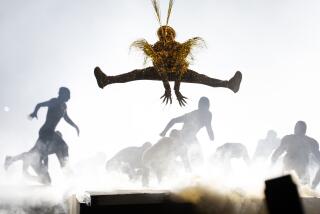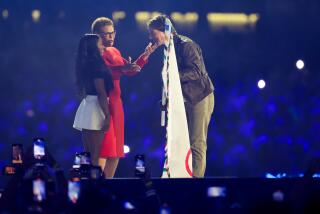Paris’ sandy social
- Share via
Paris
The cruelest month in this fair city has always been August, when the lucky flock to their summer houses in Brittany or the Dordogne, and broke, workaholic or otherwise stranded Parisians are left to wander the desolate streets with the tourists.
Paris Mayor Bertrand Delanoe had a conversation with one of those unlucky souls in 2001, an elderly woman who told him she didn’t have the means to get away for the sacred French summer holiday. So the mayor had an extravagant brainstorm -- to bring the plage, or beach (sand, palm trees, beach chairs, volleyball court and all), plus outdoor sports, activities for the kids, cafes and entertainment -- to those who couldn’t get away themselves. And to give the city’s summer tourists, the majority of whom have traditionally been American, a place to rendezvous in the city center.
Detractors of the city’s first socialist and openly gay mayor predicted that last year’s inaugural Paris Plage -- a free populist event that cost the city 1.5 million euros -- would be, according to one right-wing counselor, “Malibu-on-the-Seine,” a “homo, bi and trans” parade. Critics declared it a waste of public resources that could be spent building low- income housing or improving rough neighborhoods. Motorists were furious that the avidly anti-car Delanoe -- who is working on the installation of a Paris tramway -- wanted to reclaim the Seine for human beings, shutting down the roadways around the river to make way for bikes, roller-bladers and bathing beauties.
Delanoe was going to throw a big party, but would anybody come?
Though the monthlong festival opened in chilly, rainy weather, Parisians came in droves, families took the train in from the low-income suburbs and tourists found their way to Paris Beach. The mayor’s ambitious leap of imagination attracted a startling 2.3 million visitors -- more than anyone had predicted. Paris Plage came to symbolize Delanoe’s public spiritedness, his desire to make Paris a more democratic city, to show the world that it’s a daring, lively metropolis with its arms wide open to the world -- tourists and 2012 Olympics organizers take note -- not a dusty old European museum.
Last year, the Paris daily Le Monde declared that, illuminated by the triumph of that bright success, Delanoe had become a leading figure in the ailing Socialist party, which was set adrift when former Prime Minister Lionel Jospin trailed even the extreme right candidate Jean-Marie Le Pen, a low point in recent French political history.
Delanoe followed the Plage with last fall’s Nuit Blanche (“White Night”), in which Paris’ museums, cinemas, parks, gardens, churches and other sites stayed open all night. The festivities were marred when the mayor -- who until then was often seen around town, sometimes walking alone, without bodyguards -- was stabbed in the stomach at a public gathering by an anti-gay, extreme-right attacker. But Delanoe has never let the incident, from which he recovered fully, detract from his public poise and enthusiasm.
Dapper and sharp-witted, he held a news conference at Hotel de Ville announcing this year’s edition of Paris Plage. The event, he said, “is dedicated to the hundreds of thousands of Parisians and residents of the greater Paris area who don’t go on vacation -- the elderly, the children, in short, the people who don’t go. Last year, you teased me because the bobos came too,” he said with a smile, and added that he certainly didn’t have a problem with that, because there was room for everyone. Paris Plage, he said, represents “conviviality -- for people who are unhappy or isolated to have a manner to go out and to share ... the pleasure of being together.”
According to the Paris daily Liberation, this year, Paris Plage has inspired copy-cat operations in other parts of Europe, including Budapest Plage, Berlin Plage and Brussels Plage. And residents in other parts of France can save fare on a train ticket with Toulouse Plage, Tourcoing Plage and Wissous Plage, the latter consisting of a temporary swimming pool in the municipal stadium surrounded by sand, umbrellas, volleyball and pingpong tables designed to bring the beach to that community of 5,200 people in the Essonne.
Standing-room only
This year’s Paris Plage kicked off Sunday, July 20, amid a weeks-long heat wave, and from the moment it opened at 9 a.m. every one of the 300 lounge chairs was taken on the 1.8 miles of “plage.” In the week before the opening, trucks carted in 3,000 tons of sand and 80 palm trees -- the mayor of Paris walked around in his construction vest, a boule specialist tested the court and Jean-Christophe Choblet, a scenic designer, rushed around making sure everything was perfect. This year, Delanoe said, is “not a new concept but a new performance of a concept that worked.”
The 2003 version includes the addition of a third beach using three times more sand than last year and twice as many beach chairs and umbrellas. Delanoe maintained the 1.5 million euro budget ($1.7 million) and augmented the quality of the event by securing 800,000 euros ($900,000) from 15 selectively chosen sponsorship partners -- each of whom was asked to come up with an organic justification for participating and is not allowed to display any publicity at the banks of the Seine.
The supermarket chain Monoprix is selling organic picnic baskets; the state electricity company EDF has provided solar-paneled electricity to light the area at night; RATP is furnishing bicycles and Le Livre de Poche has created a lending library of paperbacks in multiple languages. There are activities for kids, picnic areas and sporting activities that include a climbing wall and tai chi lessons.
Unlike last year, the site is open around the clock, and despite a countrywide strike by entertainment workers that has shut down half the arts festivals in France, nightly cultural offerings include traditional music and dancing and a floating barge that acts as a stage for various live performances.
Of course, nobody swims in the deep and dirty Seine, and one of the main complaints about Paris Plage is the lack of water -- which has partly been answered by the installation of showers and fountains for cooling off. Choblet told Le Monde: “People must have the desire to believe in it. We can put tons of sand and palm trees, but if there aren’t any people in bathing suits, it isn’t a beach.”
Among the believers last year were one young shirtless Frenchman and two drunken Englishmen who decided to take the beach metaphor to its logical plunge and had to be fished out by the Seine water patrol. According to the Paris daily Liberation, last year just one exhibitionist, two fights, the theft of one video camera and one purse came about as a result of the event -- not much, they pointed out, considering the size of the crowds. City Hall called the civilized affair “a question of chance, organization and respect for the site.”
Delanoe kicked off the festivities at a reception in an elegant salon at Hotel de Ville alongside Tony Parker, the home-grown French basketball star who plays with the San Antonio Spurs of the NBA. Introducing him, Delanoe said proudly that Parker had become “one of the most popular sports figures in the world -- and in this moment one of the rare French people who is liked in the United States,” which got a laugh from a casually dressed crowd drinking Champagne and nibbling on caviar-and-salmon canapes and miniature pastel macaroons.
Parker’s presence was part of Delanoe’s strategy to turn the event into a double-duty campaign for a 2012 Olympic Games -- a bid he lost the last time around. Paris Plage, he said, is a tribute to those who love Paris, and he hoped that during the festival “Paris would be loyal to its universal vocation -- without pride, without arrogance -- to love, to share, to create through culture, sport and human civilization beyond conflict.” He hoped that Paris in the usually cruel summer months would be “a place to experience, to share, to be happy -- that the city be not a synonym for loneliness or aggression but a synonym for shared pleasures.”
The crowd cheered.
More to Read
Sign up for Essential California
The most important California stories and recommendations in your inbox every morning.
You may occasionally receive promotional content from the Los Angeles Times.













